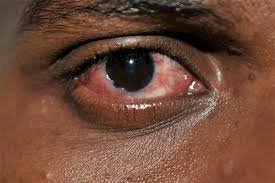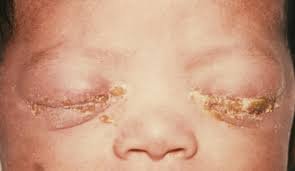Conjunctivitis, also known as pink eye, is an eye condition that causes inflammation of the conjunctiva, the thin, clear tissue that covers the white of the eye and the inside of the eyelid. In recent weeks, health authorities and concerned citizens across Northern Nigeria have been grappling with a growing health scare: the resurgence of Hemorrhagic Conjunctivitis (AHC), locally known as “Apollo.” Husaini Ibrahim Kafi in this report visits the annual disease that poses a huge public threat, highlighting the current situation, challenges to eradication, and the urgent steps needed to ensure Apollo does not return.

The Rise of Apollo in Northern Nigeria:
A highly contagious disease and rapidly spreading across communities in the northern region, particularly in Sokoto and Kano states, conjunctivitis effect is alarming, leaving medical professionals and public health experts puzzling over its link with harmattan period and beliefs.
Regions Struggling with Insecurity, Poverty
Apollo, a common eye infection is historically associated with the harmattan season. Apollo is characterized by a sudden onset of red, painful, and watery eyes. Recently, however, the disease has spread more rapidly, especially in regions already struggling with insecurity, poverty, and resistance to infectious disease vaccinations.
As advocacy groups urge authorities to adopt comprehensive strategies to curb the disease’s spread, there is a renewed focus on overcoming local barriers.
Northern Nigeria, with its dense population, particularly in urban and peri-urban areas, has seen a concerning rise in AHC cases in recent months. Initial reports of an outbreak emerged from Sokoto State, which has historically faced difficulties controlling infectious diseases. Since then, the virus has spread to Kano, one of Nigeria’s most populous states.

The resurgence was first confirmed on October 24, 2024, when the Sokoto State Ministry of Health reported a significant increase in Apollo disease cases. According to the Commissioner for Health, Hajiya Asabe Balarabe, the surge has been alarming, prompting an urgent response from the state to contain and manage the disease.
“The disease is highly contagious,” said Hajiya Balarabe. “We urge residents to prioritize good hygiene practices and avoid sharing personal items to curb its spread.”
To manage the outbreak, the Sokoto Ministry of Health has intensified public sensitization campaigns. Preventive measures include regular handwashing, disinfecting surfaces, maintaining social distancing, and avoiding contact with the eyes.
In Kano, while the Ministry of Health has not reported an outbreak, it is implementing proactive strategies to prevent one. Ibrahim Abdullahi, the Director of Public Health in Kano, emphasized the importance of “disease preparedness” to mitigate the spread.
“Our approach includes early detection, public awareness, and ensuring healthcare facilities are equipped to handle cases,” said Abdullahi. “We’re also working with schools and community leaders to spread preventive information.”
Health workers are being trained to identify symptoms early and advise patients on isolation and treatment to prevent further transmission.
Our correspondent learned that the disease has begun to spread within Kano State, with confirmed cases reported among some residents.
Symptoms and Effects of Hemorrhagic Conjunctivitis:
The symptoms of AHC typically appear suddenly, with patients experiencing intense irritation, redness, and swelling of the eyes. In severe cases, individuals may also develop painful ulcers, blurred vision, and, in extreme situations, bleeding in the eyes. Though most cases resolve within a few weeks, the discomfort and potential for long-term eye damage in severe cases should not be underestimated.
In addition to the physical health risks, the psychological impact of the disease is significant. The highly visible nature of the infection—marked by red, swollen eyes—often leads to stigma and social isolation, particularly in rural communities.
Apollo, a common eye infection, can greatly affect individuals’ lives, particularly in terms of social isolation and economic consequences. For workers, the contagious nature of Apollo often requires time off, impacting their income and productivity. Reduced work hours or missed deadlines can lead to financial strain and career setbacks. Moreover, the discomfort and sensitivity associated with Apollo can impair concentration and focus, further hindering work performance.
Students as Vulnerable Group
Students are also vulnerable to the disruptive effects of Apollo. Illness-induced absenteeism can derail their academic progress, making it difficult for them to keep up with coursework. Additionally, the discomfort and potential vision issues caused by Apollo can hinder students’ ability to engage in classroom activities and independent study, potentially leading to academic struggles and lower grades.
The social isolation caused by Apollo can further exacerbate these challenges. The fear of spreading the infection may lead individuals to avoid social gatherings, limiting opportunities for interaction and support. This isolation can contribute to feelings of loneliness and depression, further impacting overall well-being.
Voices from the Community:
In interviews with pupils and residents in Sokoto and Kano, many expressed concerns over the rapid transmission of Apollo.
“I caught it from a classmate,” a student shared. “It was painful, and I had to miss school for days.”
A mother recounted how her children contracted the disease, likely through shared school supplies. “It spread so quickly among them,” she lamented. “We’ve now started cleaning their items daily and teaching them not to touch their eyes.”
Expert Insights: Prevention is Key
Health expert Abubakar Riruwai, interviewed for this report, emphasized the importance of prevention in curbing the spread of Apollo disease.
“Good hygiene remains the cornerstone of prevention,” he said. “Frequent handwashing with soap, avoiding eye contact with unclean hands, and disinfecting shared surfaces are essential practices.”
Riruwai also warned against self-medication, urging individuals with symptoms to seek medical attention promptly. “Using unprescribed eye drops can worsen the condition. It’s crucial to get proper medical advice,” he added.
He explained that Apollo thrives during the harmattan season, when increased dust and dryness irritate the eyes and weaken defenses against infections. Health authorities are urging communities to take extra precautions during this period.



